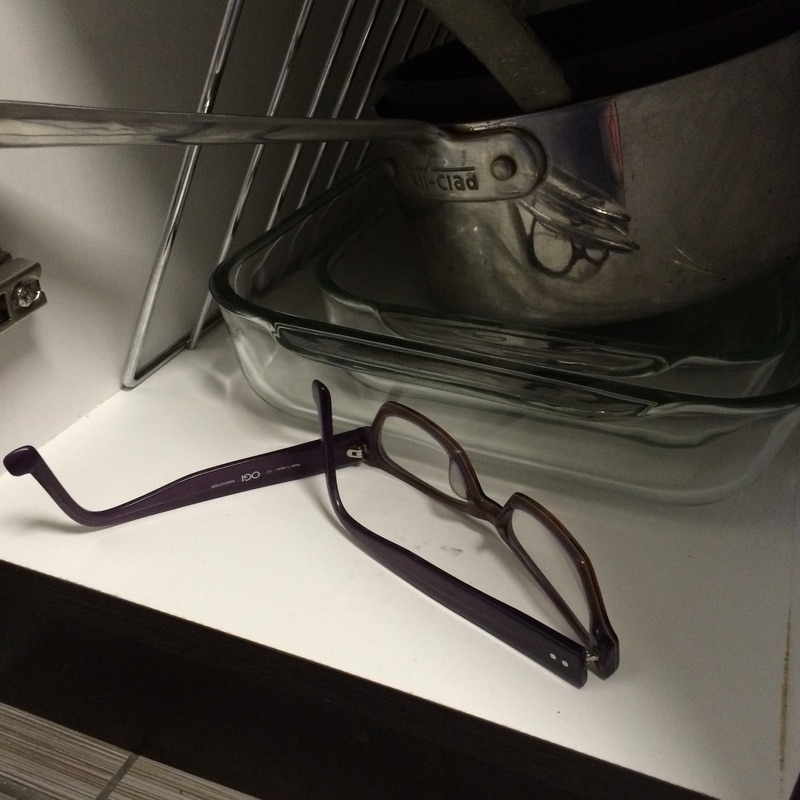|
One Saturday night, after 10 minutes of searching, I found my glasses in the kitchen cabinet where I keep the plates and bowls. My choir was giving a concert that evening, and I was just about to leave when I realized I couldn't drive if I couldn't see. At first, I’d circled our apartment slowly, with calm deliberation. After a few minutes though, I became more frantic. I whirled through each room, a tiny, anxious hurricane, leaving a trail of upturned objects in my wake. I had to drive through rain so heavy it was making national headlines, so I’d left myself plenty of time to get there. But as I retraced the same blurry path through my too-small-to-lose-your-damn-glasses apartment, the cushion of time I’d left myself got smaller, less fluffy. Accordingly, my curses and my mood became more foul. In desperation, I started looking in places where your glasses should never end up—in the shower, in the dog’s bed…inside my boots. When I finally found them sitting next to my salad plates, even I had to laugh. Ridiculous, I thought, as I snapped a pic so I could invite my friends to poke fun at me on Facebook. But when I lost my glasses again the next night, and then found them in a different kitchen cabinet, it suddenly didn’t seem so funny anymore. I took a picture, but I didn’t post it. What does someone write when they do this twice in two nights? I started wondering what was going on. Once I thought about it, the problem became obvious. It was the end of the semester and, to put it mildly...I was tired. But it just didn't seem possible to take even a few hours to relax and get my bearings. I was trying to polish off a book chapter before the end of the year (ha!). I was wrapping up my fall coaching meetings and prepping for the spring. I was also wrangling daily with my university benefits office over some paperwork they wanted me to submit but wouldn't tell me where to find. And that’s just what was going on with work. The previous Sunday had marked the third concert my choir had given in two consecutive weekends. I hadn't started Christmas shopping yet (to say nothing of shipping said presents). And I had a to-do list that I could maybe finish up if I worked on nothing else for the rest of the year. The truth is, I wasn't just tired. I was what my mom refers to as exhaustipated. “You know what it means, right?” she asked gleefully, when she introduced me to the term. She was barely able to contain herself as she waited for my response. I had an idea, but I let her enjoy saying it out loud: “It means you’re so tired you no longer give a shit!” The minute she said it, I felt this strange mixture of recognition and…I’m not sure, actually, but it wasn’t good: Of course I knew what she meant. Between Thanksgiving and about the second week of December, every academic I know is gritting their teeth through the last few classes, avoiding the growing pile of grading on their desks, and worrying over (but unable to think about) the unordered books for their winter and spring classes. Writing? Please. You‘re kidding, right? So, on the one hand, it’s pleasing to see your life reflected back to you in a single, perfect word (and if you’re a potty-mouth like I am, the profanity is especially pleasing). On the other hand, the fact that this feeling is so utterly familiar—that it’s built into the architecture of the semester and the quarter; that we find ourselves in the same place every December; and that our response many times is to try to use winter break to get more work done—this makes me sad and scared and kinda pissed off. Academics, like other workers, are suffering from increased pressure to produce more work in the same amount of time. Academic Exhaustipation isn’t an aberration. It’s merely the logical extension of a general condition that exists all semester long: too much work for the time available, and no obvious options for getting it all done. The only useful thing about being Exhaustipated is that it offers scholars the opportunity to do what we’ve actually been trained to do: stop and think about what we're doing. Then do something different. Having arrived at that fine-edged place where you’ve repeatedly mixed your personal eyewear and your Pyrex, you might finally take a moment to consider where you are. To reflect on why you do this work, and more importantly how you do it. There are several things you could do differently to reduce the chances of becoming Exhaustipated in the coming year. Here's one: You could take a break. And by “take a break,” I mean you could not-work (non-academics call it “relaxing”) from now until the end of December. I know. I know. I know that it’s easy to talk about breaks now that grades are in, and the campus receptions are over, and the library has returned to normal hours. And I know that next spring, when you’re two weeks late returning the mid-terms from every class in your 3:3 load, taking a break will seem about as ridiculous as leaving your glasses in a kitchen cabinet. I know that some of you reading this have worked all semester to create a writing groove you can trust. “Write everyday!” everyone insists, and now you’re doing it! And you might be afraid that if you stop, you’ll ruin it. That once you have an out, you might never start back up again. And I know it’s easier said than done—I’m the worst at taking a break from my writing. I’ll be sitting at my keyboard and my back will start to ache right beneath my right shoulder blade. My fingers start to get cold and I know if I keep going, they’ll actually start to turn blue. I know I should get up and move around. I have the physical therapy exercises written on a post-it note attached to my monitor. But it always seems like I’m in the middle of this great idea, and if I don’t run with it, it’s gonna get away from me. Plus I have a coaching call in an hour and I want to finish before that gets started. So somehow I look up and it’s the end of the day and I’m so stiff and achy that I—literally—shuffle and creak like an old lady when I get out of my chair. I also know that taking a break, in an environment that breeds overwork, is a skill that can be developed over time. It’s scary. It’s going to have consequences. It probably will take effort to get back into writing. But the consequences don’t have to be disastrous. It’s possible to learn to get the rest you need without ruining your writing habit or keeping you from earning tenure. The trick is to structure those breaks in a way that makes it easier to pick up the writing once the break is over. And buoyed by the increased energy that comes from proper rest, you'll be more effective in your work once you do get started again. Think about it this way: Your writing habit is a commitment you make to your writing beast, to show up, regularly and on time, whether you want to or not. And like any other committed relationship, you sometimes need a break from it, even though you don't want it to end. If your partner has forgotten to take the trash out three days in a row, despite three days of patient, soft-spoken requests from you, you don’t kick the can and scream, “That’s it, I want a divorce!” You may think this. But you do not say it. Because you do not really mean it. Instead you say “You know what? I think I need a break. I’ma go see my sister/hang out at the bookstore/catch a movie. I’ll see you when I get back.” Then, when you’re at your sister’s/the bookstore/the theatre, you don’t think about the three-day old trash. Instead, you let yourself get completely involved in your conversation/books/movie. And during the good parts, you might even think about your partner and say, “O man, she would have loved that!” Maybe not. But after a few hours, you feel better. Now that you’ve had some fun and you’re feeling reenergized, you remember how you’re always misplacing things—not just your own glasses, but your partner’s stuff too. The three-day trash doesn’t seem so bad anymore. Besides, you’re hungry, so you figure it’s time to go back home. But you take the long way back. And you stop at that café on the way and spend some quality time with a slice of blueberry bourbon cake and the novel you picked up at the bookstore. And when you finally get back to the house, the trash has been taken out. There’s this crazy delicious smell coming out of the oven. So you slip quietly into the room where your partner’s watching the game, pop in your earbuds, and listen to your favorite podcast. You pass a few words here and there—and then, all of the sudden, her team scores, she leaps out of her seat and does that funny victory dance. You laugh and you do the dance too. And then everything’s back to normal. Writing is like that. If you want to take a break, you don’t throw out your writing beast and tell it to never come back. Instead you:
That’s it. That’s all I got. Usually when I’m writing, some magical last line occurs to me, something that lets me tie everything together in a big, beautiful word-bow. But this blog is already late. And I’m too exhaustipated to keep working. So I’m gonna end here and go catch a movie. I hope you do the same. Want the monthly InkWell blog delivered straight to your inbox? Subscribe to Inkling, a bite-sized, monthly newsletter filled with ideas, inspiration, and information for academic writers.
Joni
12/22/2015 11:13:12 am
Thank you!! I was sitting here feeling exhaustipated, but didn't have the word for it. It helps to realize that I am not the only one. Thank you.
Michelle
12/22/2015 11:15:34 am
O Joni, you are *so* not the only one! You're the Every One :). Now the question is--what are you going to do to let yourself relax?
Dear Michelle,
Michelle
1/7/2016 02:19:17 pm
Woot Woot!!! That's amazing Kei. I'm gonna start sending people to you when they need help ending their semester properly. :) Isn't it nice to start Spring semester with a little bit of energy? I'm *so* glad you found the post helpful--that gives ME the boost I need to get the next one out the door.
Michelle
4/30/2021 07:34:09 am
Thanks for reading! Comments are closed.
|
|
© 2018 InkWell Academic Writing Retreats
|

